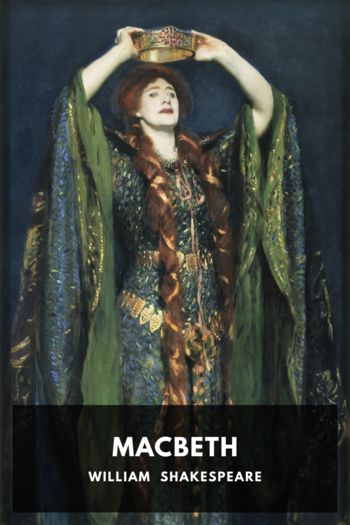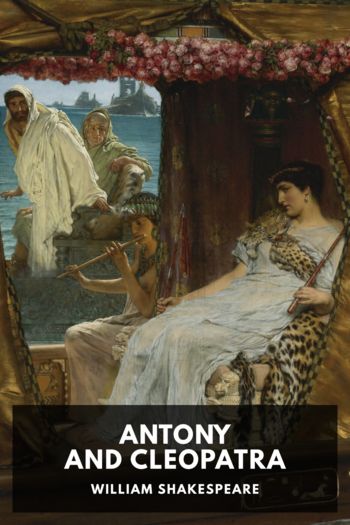Macbeth William Shakespeare (ereader with android .txt) 📖

- Author: William Shakespeare
Book online «Macbeth William Shakespeare (ereader with android .txt) 📖». Author William Shakespeare
I doubt some danger does approach you nearly:
If you will take a homely man’s advice,
Be not found here; hence, with your little ones.
To fright you thus, methinks, I am too savage;
To do worse to you were fell cruelty,
Which is too nigh your person. Heaven preserve you!
I dare abide no longer. Exit. Lady Macduff
Whither should I fly?
I have done no harm. But I remember now
I am in this earthly world; where to do harm
Is often laudable, to do good sometime
Accounted dangerous folly: why then, alas,
Do I put up that womanly defence,
To say I have done no harm?
I hope, in no place so unsanctified
Where such as thou mayst find him.
What, you egg! Stabbing him.
Young fry of treachery!
He has kill’d me, mother:
Run away, I pray you! Dies. Exit Lady Macduff, crying “Murder!” Exeunt Murderers, following her.
England. Before the King’s palace.
Enter Malcolm and Macduff. MalcolmLet us seek out some desolate shade, and there
Weep our sad bosoms empty.
Let us rather
Hold fast the mortal sword, and like good men
Bestride our down-fall’n birthdom: each new morn
New widows howl, new orphans cry, new sorrows
Strike heaven on the face, that it resounds
As if it felt with Scotland and yell’d out
Like syllable of dolour.
What I believe I’ll wail,
What know believe, and what I can redress,
As I shall find the time to friend, I will.
What you have spoke, it may be so perchance.
This tyrant, whose sole name blisters our tongues,
Was once thought honest: you have loved him well:
He hath not touch’d you yet. I am young; but something
You may deserve of him through me, and wisdom
To offer up a weak poor innocent lamb
To appease an angry god.
But Macbeth is.
A good and virtuous nature may recoil
In an imperial charge. But I shall crave your pardon;
That which you are my thoughts cannot transpose:
Angels are bright still, though the brightest fell:
Though all things foul would wear the brows of grace,
Yet grace must still look so.
Perchance even there where I did find my doubts.
Why in that rawness left you wife and child,
Those precious motives, those strong knots of love,
Without leave-taking? I pray you,
Let not my jealousies be your dishonours,
But mine own safeties. You may be rightly just,
Whatever I shall think.
Bleed, bleed, poor country!
Great tyranny! lay thou thy basis sure,
For goodness dare not cheque thee: wear thou thy wrongs;
The title is affeer’d! Fare thee well, lord:
I would not be the villain that thou think’st
For the whole space that’s in the tyrant’s grasp,
And the rich East to boot.
Be not offended:
I speak not as in absolute fear of you.
I think our country sinks beneath the yoke;
It weeps, it bleeds; and each new day a gash
Is added to her wounds: I think withal
There would be hands uplifted in my right;
And here from gracious England have I offer
Of goodly thousands: but, for all this,
When I shall tread upon the tyrant’s head,
Or wear it on my sword, yet my poor country
Shall have more vices than it had before,
More suffer and more sundry ways than ever,
By him that shall succeed.
It is myself I mean: in whom I know
All the particulars of vice so grafted
That, when they shall be open’d, black Macbeth
Will seem as pure as snow, and the poor state
Esteem him as a lamb, being compared
With my confineless harms.
Not in the legions
Of horrid hell can come a devil more damn’d
In evils to top Macbeth.
I grant him bloody,
Luxurious, avaricious, false, deceitful,
Sudden, malicious, smacking of every sin
That has a name: but there’s no bottom, none,
In my voluptuousness: your wives, your daughters,
Your matrons and your maids, could not fill up
The cistern of my lust, and my desire
All continent impediments would o’erbear
That did oppose my will: better Macbeth
Than such an one to reign.
Boundless intemperance
In nature is a tyranny; it hath been
The untimely emptying of the happy throne
And fall of many kings. But fear not yet
To take upon you what is yours: you may
Convey your pleasures in a spacious plenty,
And yet seem cold, the time you may so hoodwink.
We have willing dames enough; there cannot be
That vulture in you, to devour so many
As will to greatness dedicate themselves,
Finding it so inclined.
With this there grows
In my most ill-composed affection such
A stanchless avarice that, were I king,
I should cut off the nobles for their lands,
Desire his jewels and this other’s house:
And my more-having would be as a sauce
To make me hunger more; that I should forge
Quarrels unjust against the good and loyal,
Destroying them for wealth.
This avarice
Sticks deeper, grows with more pernicious root
Than summer-seeming lust, and it hath been
The sword of our slain kings: yet do not fear;
Scotland hath foisons to fill up your will,
Of your mere own: all these are portable,
With other graces weigh’d.
But I have none: the king-becoming graces,
As justice, verity, temperance, stableness,
Bounty, perseverance, mercy, lowliness,
Devotion, patience, courage, fortitude,
I have no relish of them, but abound
In the division of each several crime,
Acting it many ways. Nay, had I power, I should
Pour the sweet milk of concord into hell,
Uproar the universal peace, confound
All unity on earth.
If such a one be fit to govern, speak:
I am as I have spoken.
Fit to govern!
No, not to live. O nation miserable,
With an untitled tyrant bloody-scepter’d,
When shalt thou see thy wholesome days again,
Since that the truest issue of thy throne
By his own interdiction stands accursed,
And does blaspheme his breed? Thy royal father
Was a most sainted king: the queen that bore thee,
Oftener upon her knees than on her feet,
Died every day she lived. Fare thee well!
These evils thou repeat’st upon thyself
Have banish’d me from Scotland. O my breast,
Thy hope ends here!
Macduff, this noble passion,
Child of integrity, hath from my soul
Wiped





Comments (0)